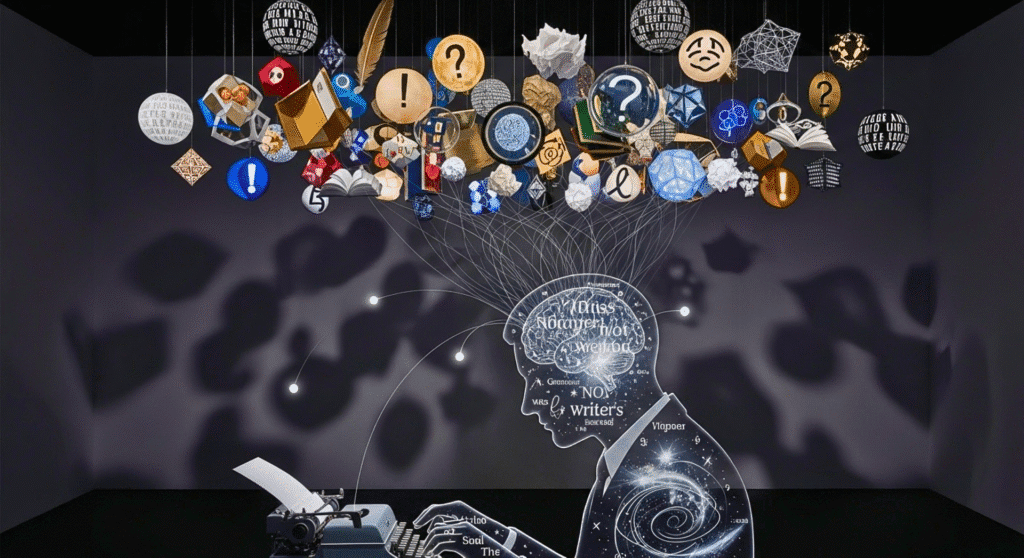

The world is a tapestry woven from countless stories, but it is the genius writer who holds the loom, whose mind is a crucible where disparate threads of thought, emotion, and observation are alchemized into something enduring and new. This is not a gift bestowed from on high, but a faculty honed by relentless curiosity, a capacity for profound empathy, and an almost pathological need to understand the fundamental mechanics of the human heart. To step into the mind of such a writer is to enter a cathedral of thought, where every flicker of light and shadow, every whispered word, every grand silence is catalogued, considered, and stored for future use.
At the heart of every genius writer lies a spark—a sudden illumination that reveals hidden connections between disparate ideas. This flash can come while watching raindrops trace patterns on a window, listening to a stranger’s laugh echo down an alley, or simply closing one’s eyes and letting memory and longing entwine. In that moment, a narrative seed is planted, brimming with potential yet awaiting the breath of technique to grow. The spark does not explain itself; it demands curiosity, inviting the writer to follow its glow wherever it leads.
That primal impulse continually whispers, “What if?”—a question that fractures reality into infinite possibilities. Genius writers hold that question as both compass and catalyst, daring to explore worlds where time flows backward, objects whisper forgotten histories, or characters defy the rules of logic and yet feel utterly alive. They trace the contours of the unknown, guided by the belief that literature is a portal, not a prison. Each new twist of that initial spark charts a course toward unexplored territory.
Memory serves as the crucible where life’s raw materials fuse into narrative gold. A moment of heartbreak, an echo from childhood laughter, or the tang of sea salt on the tongue can metamorphose into characters, settings, and conflicts that pulse with authenticity. Genius writers learn to excavate memory without being consumed by nostalgia, sifting through personal archives to find fragments that resonate universally. They understand that specificity births empathy, and the closer they lean into their own histories, the more room their work leaves for readers to inhabit.
Yet memory alone does not suffice; it must undergo alchemical transformation. Writers bend recollections, amplify emotions, and reorder chronology to craft the arcs readers crave. The melancholic afternoon becomes a stormy climax, a fleeting glance turns into lifelong obsession, and a simple family dinner evolves into a battleground of unspoken truths. Through this process, memory relinquishes its rawness and becomes narrative power—an ember fanned by imagination into a sustaining flame.
Emotional depth is the lifeblood of enduring literature, and genius writers learn to ride its tides with both courage and finesse. They don’t shy away from extremes—ecstasy and despair, tenderness and fury—but channel these currents into language that sings. Sentences tremble with longing, paragraphs pulse with rage, and entire chapters swell with the ache of loss or the thrill of discovery. By mapping the topography of the heart, they connect with readers on a visceral level that transcends mere story.
Still, raw feeling needs discipline to avoid spiraling into melodrama. Writers craft emotional beats with precision, weaving them into the larger narrative so that every tear, laugh, or sigh serves the story’s architecture. They juxtapose joy and sorrow, insert moments of quiet reflection between crises, and calibrate pacing so emotion feels inevitable rather than overwhelming. In doing so, they create a rhythmic dance of feeling that sustains reader engagement and allows complex truths to emerge.
Beneath conscious thought lies a vast reservoir of symbols, archetypes, and half-glimpsed visions that genius writers tap like hidden springs. Dreams, daydreams, and fragmented images surface in their notebooks as loose threads waiting to be woven into tapestries of meaning. They trust this subterranean realm to supply raw narrative material that logic alone cannot generate. By reckoning with the surreal, they access universal motifs—death and rebirth, transformation and transcendence—that resonate across cultures.
To engage the unconscious requires both surrender and structure. Writers free-associate in the morning hours, jotting down dream fragments before they dissipate, then return later with a critical eye to select and refine. They might sketch surreal landscapes, assign characters to personified emotions, or record the strange rhythms of half-remembered dialogue. This ongoing dialogue between the conscious and the unconscious yields writing that feels both fresh and deeply archetypal, as if it emerges from the collective soul.
Even the most dazzling inspiration must pass through the forge of technique to emerge as compelling literature. Genius writers study form and function, dissecting masterworks to learn how tone, point of view, and narrative structure shape reader experience. They experiment relentlessly—beginning stories in medias res, shifting between speakers, or collapsing chapters into stream-of-consciousness passages. Every choice becomes a tool for sculpting mood, pacing revelations, and guiding emotional resonance.
Language itself becomes a playground of texture and sound. Writers hone their ear for rhythm and cadence, matching the flow of sentences to the energy of the moment—short, staccato bursts for tension; sinuous, lyrical lines for reflection. They cultivate a precise vocabulary, selecting words for their denotations, connotations, and musical qualities. In the forge of technique, rough ideas become sharp instruments, ready to carve meaning into the reader’s mind.
Contrary to romantic images of genius as effortless, great writers build discipline into their daily lives. They establish writing rituals—an early-morning hour at a desk by a window, afternoon walks to unlock new ideas, or evening readings to recharge their inner libraries. These rituals signal their brains to shift into creation mode, transforming blank pages from barriers into invitations. By cultivating consistent habits, they ensure that inspiration, when it arrives, finds them ready.
Discipline also means embracing revision as an act of courage. Genius writers wrestle with their drafts, cutting the beloved sentence that slows momentum, restructuring scenes to heighten stakes, or rewriting entire sections to deepen theme. They invite feedback from trusted readers, balance their own intuition against external perspectives, and persist through frustration and self-doubt. In the crucible of revision, initial sparks ignite into fully realized works.
Writers do not create in isolation; they engage in a perpetual conversation with culture, history, and other artists. They read widely—ancient myths, contemporary essays, cross-cultural folklore—to absorb ideas and narrative strategies that challenge their assumptions. They watch films, study paintings, and follow musical scores to learn how different mediums shape meaning. Each encounter becomes a mirror that reflects new possibilities for their own work.
This dialogue extends to the living world as well. Genius writers observe everyday details—how light falls on pavement at dusk, the subtle exchange of glances on a crowded train, the hum of insects in a summer field—and weave these sensory impressions into their fiction. By registering the world’s rhythms and textures, they lend their stories a palpable sense of immediacy. Their narratives become both mirrors and windows: reflections of the reader’s experience and portals into lives they might never know.

Language is both clay and crucible for genius writers—the medium through which they shape thought and transmute it into shared experience. They understand that words carry energetic weight: some soothe, some jolt, and some reveal hidden truths. A well-placed metaphor can open a vista of insight; a cleverly turned phrase can expose a character’s soul. Writers continually expand their lexicons, mining archaic words for their resonance and inventing new terms to fill conceptual gaps.
Yet alchemy demands balance. Excessive flourish can obscure meaning, while overly plain diction can stifle emotion. Genius writers walk this tightrope, calibrating each sentence to carry maximum clarity and vitality. They layer prose with subtle echoes—repeated sounds, thematic motifs, rhythmic structures—that reward readers’ attention. Through this linguistic alchemy, language becomes more than a tool; it transforms into a living force that animates ideas and stirs the heart.
When genius writers depart, they leave behind texts that continue to speak to new generations, their creative minds echoing across time. Readers find in their works not only stories but profound meditations on love, loss, freedom, and the human condition. These legacies shape literary traditions, inspire new voices, and remind us that imagination is one of humanity’s greatest gifts. A single line of poetry or a well-crafted turn of phrase can spark a revolution in thought or offer solace in solitude.
Beyond published works, genius minds bequeath methods and mindsets: the courage to embrace vulnerability, the willingness to challenge norms, and the discipline to refine raw vision into enduring art. Their letters, notebooks, and interviews become manuals for aspiring writers, guiding them to cultivate their own sparks of genius. In this way, the creative mind propagates itself, a living lineage of imagination stretching into the future.
In the end, the mind of the genius writer is not a place of pure magic, but of hard work, relentless observation, and a profound, almost spiritual commitment to their craft. It is a mind that is always on, always listening, always searching for the next story hidden in plain sight. They are the architects of dreams, the cartographers of the human soul, and the quiet, persistent artists who remind us, again and again, that our lives, no matter how ordinary they may seem, are filled with stories waiting to be told. The world is a book, and they are the ones who teach us how to read it.
The creative mind of a genius writer may feel distant and rarefied, but its essence is accessible to anyone willing to explore. Begin by honoring fleeting thoughts—jot them down without judgment, for in their ephemerality they may hide your next great story. Cultivate rituals that invite both imagination and discipline, whether it’s a sunlit writing nook, a daily walk in nature, or a nightly reading of inspiring works. Experiment with technique; blend genres and forms until you discover what ignites your own spark.
Above all, trust both your conscious craft and your unconscious wisdom. Engage your emotions fully, excavate your memories bravely, and remain open to the world’s endless well of wonder. Every writer’s journey is unique, yet we all share the same ingredients: curiosity, courage, and the alchemy of words. Nurture these gifts, and you too can join the lineage of those whose creative minds transform the ordinary into the extraordinary.
Do any of these insights about imagination, memory, or technique resonate with your own writing process? If you’d like, I can offer targeted exercises—whether it’s dream-journaling prompts, emotional mapping worksheets, or form-bending experiments—to help you cultivate your inner genius. Let me know which area you’d like to explore next.